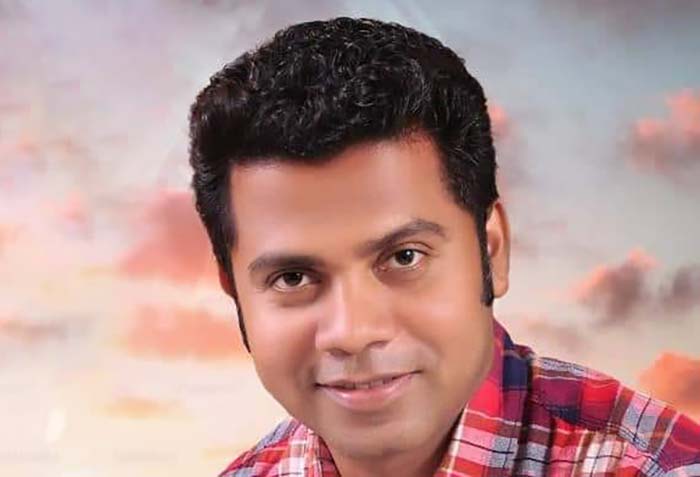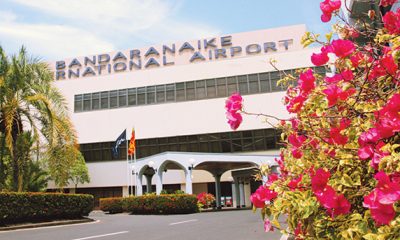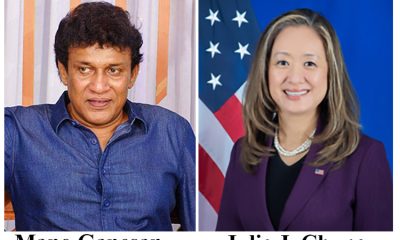News
Health sector strikes must not drag on – Nalinda

Government creating animosity between doctors and others
By Saman Indrajith
The Sri Lankan healthcare system has been allowed to atrophy since 1977 due to a lack of funding, National People’s Power (NPP) stalwart and former MP, Dr. Nalinda Jayatissa said.
He said that the country’s hospital system was established by the British as a necessity for its colonial economy, and by 1948, Sri Lanka had a robust healthcare system. And, until 1977, successive governments were investing about five percent of the GDP in health.
“Things changed dramatically after 1977. Since 1977, governments have washed their hands off of state-funded healthcare, and by 2020, out-of-pocket expenses on healthcare by people was about 60 percent.
“Then the economic crisis happened, and now we see a significant increase in people coming into government hospitals. The government hospitals can’t deal with this influx. There are no medicines, the quality of medicine available is suspect, healthcare professionals are leaving the country, and the equipment is broken.”
Dr. Jayatissa said politicians and bureaucrats are keen on buying expensive machinery but are less interested in maintaining the equipment.
“Most of these machines need to be operated in controlled environments. There should be trained staff, and the machines should be periodically repaired. None of this happens, and the machines break down. This is a serious situation, and the Health Ministry is virtually headless,” he said.
The NPP stalwart added that the government is also deliberately causing friction. It gave the doctors a 35,000 DAT increase, and other unions are up in arms about this.
“We are very concerned about the impact of union action on healthcare. At the end of the day, these strikes affect people. The government is also harassing people on a daily basis. However, the demands of the unions are just.”
He said that health staff are under tremendous stress and they deserve a salary hike, like everyone else in the country.
“We must also wonder if the government wanted to create problems between various staff categories. Now the animosity between doctors and other staffers is at an all-time high. There have been fisticuffs between doctors and other staffers. Unions must also understand the politics behind some maneuvers. We must try to win our demands with minimal impact on people.”
Dr. Jayatissa said that during the economic crisis, many nations offered to help the Sri Lankan healthcare system. Politicians and some senior officials used these opportunities to enrich themselves. What is happening in the health system is the best example of why the country needs a change in political leadership.
“About four years ago, Japan offered to develop angiogram units in five locations after identifying that about 45 percent of people die due to stroke and heart attacks. This was a 28 billion-rupee project, with 27 billion from Japan, to expand angiogram units in Kandy, Kurunegala and Anuradhapura hospitals and establish new units in Badulla, and Trincomalee. The Health Ministry recruited new people, and discussions were ongoing. The Japanese government then unilaterally cancelled the deal because there were allegations that one Minister solicited bribes from a Japanese company. The Minister was not penalized, but the project was halted. How many people were affected by this? Corruption is a main reason why we are not getting help,” he said.
Dr. Jayatissa said there is also a mechanism to predict the amount of medicine the country needs per year. There are also some in-built mechanisms to reduce corruption.
“We have the NMRA, SPC and medical supplies unit. We have three separate units as a way to keep tabs on each other. However, politicians have paralyzed these institutions to help them embezzle. The health ministry purchased a counterfeit human immunoglobulin consignment and paid a corrupt company a billion rupees. We have paid a billion rupees for coloured water. Imagine the level of corruption?” he said.
The former MP added that the Ministry of Health has an institution that was established to regulate private healthcare providers. However, the institution has done very little to ensure private healthcare producers provide a quality service.
“90 percent of resident patients are in government hospitals. However, 50 percent of OPD patients go to the private sector. An NPP government will regulate the private sector and strengthen government hospitals. Then people will choose where they want to go,” he said.
News
US sports envoys to Lanka to champion youth development

The U.S. Embassy in Colombo welcomed the U.S. Sports Envoys to Sri Lanka, former National Basketball Association (NBA) and Women’s National Basketball Association (WNBA) players Stephen Howard and Astou Ndiaye, from June 8 through 14.
The Public Diplomacy section of the U.S. Embassy said that it would launch a weeklong basketball program intended to harness the unifying power of sports, made possible through collaboration with Foundation of Goodness and IImpact Hoop Lab.
While in Sri Lanka, Howard and Ndiaye, both retired professional basketball players, will conduct a weeklong program, Hoops for Hope: Bridging Borders through Basketball. The Sports Envoys will lead basketball clinics and exhibition matches and engage in leadership sessions in Colombo and Southern Province for youth aged 14-18 from Northern, Uva, Eastern and Western Provinces, offering skills and leadership training both on and off the court. The U.S. Envoys will also share their expertise with the Sri Lanka Basketball Federation, national coaches, and players, furthering the development of basketball in the country. Beyond the clinics, they will collaborate with Sri Lankan schoolchildren to take part in a community service project in the Colombo area.
“We are so proud to welcome Stephen and Astou as our Sports Envoys to Sri Lanka, to build on the strong people-to-people connections between the United States and Sri Lanka,” said U.S. Ambassador Julie Chung. “The lessons that will be shared by our Sports Envoys – communication, teamwork, resilience, inclusion, and conflict resolution – are essential for leadership development, community building, equality, and peace. The U.S. Sports Envoy program is a testament to our belief that sports can be a powerful tool in promoting peace and unity.”
News
Rahuman questions sudden cancellation of leave of CEB employees

SJB Colombo District MP Mujibur Rahuman in parliament demanded to know from the government the reasons for CEB suspending the leave of all its employees until further notice from Thursday.
MP Rahuman said that the CEB has got an acting General Manager anew and the latter yesterday morning issued a circular suspending leave of all CEB employees with immediate effect until further notice.
“We demand that Minister Kanchana Wijesekera should explain this to the House. This circular was issued while this debate on the new Electricity Amendment Bill was pending. There are many who oppose this Bill. The Minister must tell parliament the reason for the urge to cancel the leave of CEB employees,” the MP said.However, Speaker Mahinda Yapa Abeywardena prevented Minister Wijesekera responding to the query and said that the matter raised by MP Rahuman was not relevant.
News
CIPM successfully concludes 8th Annual Symposium

The Chartered Institute of Personnel Management (CIPM) successfully concluded the 8th Annual CIPM Symposium, which took place on 31st May 2024. Themed “Nurturing the Human Element—Redefining HRM in a Rapidly Changing World,” the symposium underscored the pivotal role of human resource management (HRM) in today’s dynamic global landscape. Since its inception in 1959, CIPM has been dedicated to advancing the HR profession through education, professional development, and advocacy, solidifying its position as Sri Lanka’s leading professional body for HRM.
Ken Vijayakumar, the President of the CIPM, graced the occasion as the chief guest. The symposium commenced with the welcome address by the Chairperson, Prof. Arosha Adikaram, followed by the Web Launch of the Symposium Proceedings and Abstract Book by the CIPM President. The event featured distinguished addresses, including a speech by Chief Guest Ken Vijayakumar, President of CIPM, and an address by Guest of Honor Shakthi Ranatunga, Chief Operating Officer of MAS Holdings Pvt. Ltd., Sri Lanka.
The symposium also featured an inspiring keynote address by Prof. Mario Fernando, Professor of Management and Director of the Centre for Cross Cultural Management (CCCM) at the University of Wollongong, Australia.
Vote of Thanks of the inauguration session was delivered by Dr. Dillanjani Weeratunga, Symposium Co-chair.
The symposium served as a comprehensive platform for researchers to present their findings across a wide range of critical topics in HRM. These included Cultural Diversity and Inclusion, Talent Development and Retention, Ethical Leadership and Corporate Social Responsibility, Adapting to Technological Advancements, Mental Health and Well-being at Work, Global Workforce Challenges, Employee Empowerment, and Reskilling and Upskilling.
The plenary session was led by Prof. Wasantha Rajapakse. Certificates were awarded to the best paper presenters during the valedictory session, followed by a vote of thanks delivered by Kamani Perera, Manager of Research and Development.
The annual symposium of CIPM was a truly inclusive event, attracting a diverse audience that spanned undergraduates, graduates, working professionals, research scholars and lecturers. This widespread interest highlights the symposium’s significance in the field of HRM, offering a unique opportunity for everyone to network and learn from scholarly brains.The CIPM International Research Symposium was sponsored by Hambantota International Port, Sri Lanka Institute of Information Technology (SLIIT), E B Creasy & Co. PLC, and Print Xcel Company.
























